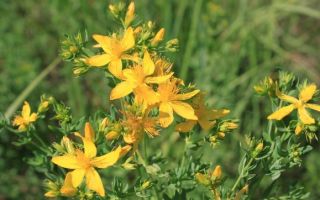St. John's wort is a herbaceous perennial plant with yellow flowers, fused in threads in three bunches.
Content
Description and composition
In total, there are 28 species of plants in the St. John's wort family under the common name St. John's wort. But fortunately, they have different appearances and only a few have healing properties. This article is about St. John's wort. It gets its name from the leaves, which are covered with small dots, giving the impression that someone deliberately made the punctures with a needle.
Plant height 30-100 cm.
Flowering time is June-July.
The grass is collected during flowering. Cut off the entire stem and separate the flowering shoots from the coarse stems. Drying should be done in a ventilated room protected from sunlight or in a dryer at a temperature not exceeding 35-40 degrees.
For medicinal purposes, leaves and flowers are used, which contain the following beneficial substances:
- flavonoids,
- saponins,
- hypericin glycoside,
- alkaloids,
- choline,
- vitamins C, P, PP,
- carotene,
- phytoncides,
- resin,
- ash,
- macroelements - potassium, calcium, manganese, iron,
- trace elements - magnesium, copper, zinc, cobalt, molybdenum, chromium, aluminum, barium, selenium, strontium, cadmium, lead, boron,
- essential oil,
- dyes and tannins.
St. John's wort, when ground, has a peculiar astringent, bitter-resinous taste.
The plant is poisonous.
Properties used in treatment
The herb has the following pharmacological properties:
- anti-inflammatory,
- painkiller,
- carminative,
- astringent,
- anthelmintic,
- antispasmodic,
- hemostatic,
- soothing,
- tonic,
- antiputrefactive,
- antimicrobial,
- diaphoretic,
- diuretic,
- bronchodilator,
- restorative.
What diseases does it help with?
St. John's wort as a medicinal plant was known in ancient Greece, and in Rus' it was called “the herb for ninety-nine diseases.”
Herbal infusion is used for diseases such as
- diseases of the gastrointestinal tract,
- colitis,
- diarrhea,
- haemorrhoids,
- stomach ache,
- gout,
- bedwetting in children,
- anti-inflammatory for skin lesions,
- rheumatism.
An alcohol infusion diluted with water is used to rinse the mouth to eliminate bad odor; the clean tincture is used to lubricate the gums to strengthen them.
Methods of application
To prepare the infusion, you need to brew 10 grams of dry St. John's wort herb in 1 glass of boiling water and leave. Take 1 tablespoon 2-3 times a day after meals.
The alcohol tincture is prepared as follows - 15-20 grams of dry herb is infused in half a liter of alcohol or vodka. Take 30 drops with water 3 times a day after meals.
To rinse your mouth if you have a bad odor, dilute 20-30 drops of alcohol tincture in half a glass of water.
Contraindications
St. John's wort should be used with caution, strictly adhere to the dosage, and it is better to take it in preparations. An overdose may cause discomfort in the liver, bitterness in the mouth, constipation, and loss of appetite.
Not recommended for use
- during exposure to the sun, as allergic reactions may occur,
- for hypertension,
- jade,
- liver cirrhosis.







